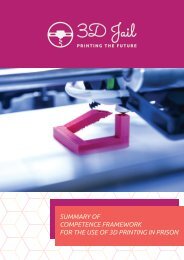3D Jail Project - IO1 - Competence framework for 3D printing in jail
Intellectual Output 1 The main innovative element of IO1 is to entail professionalizing competencies on the use of 3D printing technologies in the learning context of people with fewer opportunities because of their status of prisoners, ex-prisoners or subjected to alternative measures to detention. It is innovative because – in a pioneering way in Europe – it puts the basis to frame this kind of competencies in relation with restricted people, in the context of prison security, and it challenges penitentiary administrations to innovate their procedures and conditions to use even more ICT technologies inside their structures. It also poses prisons’ educational systems before the challenge to include these specific competencies in the educational experience of the inmates.
Intellectual Output 1 The main innovative element of IO1 is to entail professionalizing competencies on the use of 3D printing technologies in the learning context of people with fewer opportunities because of their status of prisoners, ex-prisoners or subjected to alternative measures to detention. It is innovative because – in a pioneering way in Europe – it puts the basis to frame this kind of competencies in relation with restricted people, in the context of prison security, and it challenges penitentiary administrations to innovate their procedures and conditions to use even more ICT technologies inside their structures. It also poses prisons’ educational systems before the challenge to include these specific competencies in the educational experience of the inmates.
- No tags were found...
You also want an ePaper? Increase the reach of your titles
YUMPU automatically turns print PDFs into web optimized ePapers that Google loves.
Glossary<br />
This Glossary gives an overview of used vocabulary and their mean<strong>in</strong>g. This glossary is supposed<br />
to be extended <strong>in</strong> the follow<strong>in</strong>g Intellectual Outputs and to be add up <strong>in</strong> the process of <strong>3D</strong><strong>Jail</strong>.<br />
<strong>Competence</strong> 7<br />
ability to apply learn<strong>in</strong>g outcomes adequately <strong>in</strong> a def<strong>in</strong>ed context (education, work, personal or<br />
professional development)<br />
or ability to use knowledge, skills and personal, social and/or methodological abilities, <strong>in</strong> work or study<br />
situations and <strong>in</strong> professional and personal development.<br />
Comment: competence is not limited to cognitive elements (<strong>in</strong>volv<strong>in</strong>g the use of theory, concepts or tacit<br />
knowledge); it also encompasses functional aspects (<strong>in</strong>clud<strong>in</strong>g technical skills) as well as <strong>in</strong>terpersonal<br />
attributes (e.g. social or organisational skills) and ethical values.<br />
Source: Cedefop; European Parliament and Council of the<br />
European Union, 2008.<br />
Qualification<br />
Qualification covers different aspects:<br />
• <strong>for</strong>mal qualification: the <strong>for</strong>mal outcome (certificate, diploma or title) of an assessment process which is<br />
obta<strong>in</strong>ed when a competent body determ<strong>in</strong>es that an <strong>in</strong>dividual has achieved learn<strong>in</strong>g outcomes to given<br />
standards and/or possesses the necessary competence to do a job <strong>in</strong> a specific area of work. a qualification<br />
confers official recognition of the value of learn<strong>in</strong>g outcomes <strong>in</strong> the labour market and <strong>in</strong> education and<br />
tra<strong>in</strong><strong>in</strong>g. a qualification can be a legal entitlement to practise a trade (OECD);<br />
• Job requirements: knowledge, aptitudes and skills required to per<strong>for</strong>m specific tasks attached to a<br />
particular work position (ilo).<br />
Source: Cedefop, 2008, based on Eurydice, 2006; European Tra<strong>in</strong><strong>in</strong>g Foundation, 1997; OECD, 2007; ILO,<br />
1998.<br />
Award<strong>in</strong>g body<br />
a body issu<strong>in</strong>g qualifications (certificates, diplomas or titles) <strong>for</strong>mally recognis<strong>in</strong>g the learn<strong>in</strong>g outcomes<br />
(knowledge, skills and/or competences) of an <strong>in</strong>dividual, follow<strong>in</strong>g an assessment procedure.<br />
Source: Cedefop, 2008<br />
7 ESCO applies the same def<strong>in</strong>ition of "competence" as the European Qualification Framework (EQF). Accord<strong>in</strong>g to this<br />
"competence means the proven ability to use knowledge, skills and personal, social and/or methodological abilities, <strong>in</strong><br />
work or study situations and <strong>in</strong> professional and personal development." They are described <strong>in</strong> terms of responsibility and<br />
autonomy.<br />
While sometimes used as synonyms, the terms skill and competence can be dist<strong>in</strong>guished accord<strong>in</strong>g to their scope. The<br />
term skill refers typically to the use of methods or <strong>in</strong>struments <strong>in</strong> a particular sett<strong>in</strong>g and <strong>in</strong> relation to def<strong>in</strong>ed tasks. The<br />
term competence is broader and refers typically to the ability of a person - fac<strong>in</strong>g new situations and un<strong>for</strong>eseen<br />
challenges - to use and apply knowledge and skills <strong>in</strong> an <strong>in</strong>dependent and self-directed way.<br />
39





